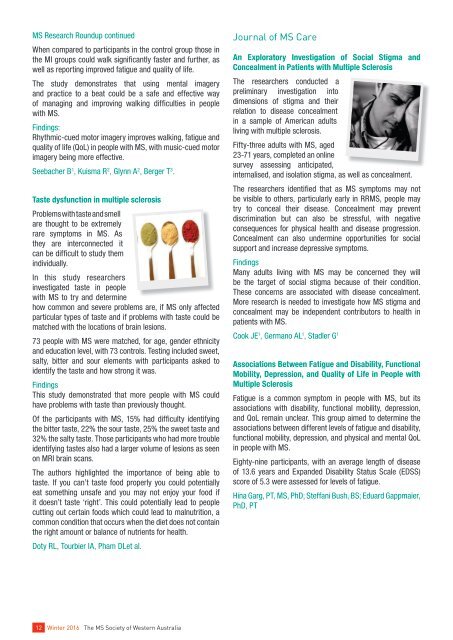Create successful ePaper yourself
Turn your PDF publications into a flip-book with our unique Google optimized e-Paper software.
MS Research Roundup continued<br />
When compared to participants in the control group those in<br />
the MI groups could walk significantly faster and further, as<br />
well as reporting improved fatigue and quality of life.<br />
The study demonstrates that using mental imagery<br />
and practice to a beat could be a safe and effective way<br />
of managing and improving walking difficulties in people<br />
with MS.<br />
Findings:<br />
Rhythmic-cued motor imagery improves walking, fatigue and<br />
quality of life (QoL) in people with MS, with music-cued motor<br />
imagery being more effective.<br />
Seebacher B 1 , Kuisma R 2 , Glynn A 2 , Berger T 3 .<br />
Taste dysfunction in multiple sclerosis<br />
Problems with taste and smell<br />
are thought to be extremely<br />
rare symptoms in MS. As<br />
they are interconnected it<br />
can be difficult to study them<br />
individually.<br />
In this study researchers<br />
investigated taste in people<br />
with MS to try and determine<br />
how common and severe problems are, if MS only affected<br />
particular types of taste and if problems with taste could be<br />
matched with the locations of brain lesions.<br />
73 people with MS were matched, for age, gender ethnicity<br />
and education level, with 73 controls. Testing included sweet,<br />
salty, bitter and sour elements with participants asked to<br />
identify the taste and how strong it was.<br />
Findings<br />
This study demonstrated that more people with MS could<br />
have problems with taste than previously thought.<br />
Of the participants with MS, 15% had difficulty identifying<br />
the bitter taste, 22% the sour taste, 25% the sweet taste and<br />
32% the salty taste. Those participants who had more trouble<br />
identifying tastes also had a larger volume of lesions as seen<br />
on MRI brain scans.<br />
The authors highlighted the importance of being able to<br />
taste. If you can’t taste food properly you could potentially<br />
eat something unsafe and you may not enjoy your food if<br />
it doesn’t taste ‘right’. This could potentially lead to people<br />
cutting out certain foods which could lead to malnutrition, a<br />
common condition that occurs when the diet does not contain<br />
the right amount or balance of nutrients for health.<br />
Doty RL, Tourbier IA, Pham DLet al.<br />
Journal of MS Care<br />
An Exploratory Investigation of Social Stigma and<br />
Concealment in Patients with Multiple Sclerosis<br />
The researchers conducted a<br />
preliminary investigation into<br />
dimensions of stigma and their<br />
relation to disease concealment<br />
in a sample of American adults<br />
living with multiple sclerosis.<br />
Fifty-three adults with MS, aged<br />
23-71 years, completed an online<br />
survey assessing anticipated,<br />
internalised, and isolation stigma, as well as concealment.<br />
The researchers identified that as MS symptoms may not<br />
be visible to others, particularly early in RRMS, people may<br />
try to conceal their disease. Concealment may prevent<br />
discrimination but can also be stressful, with negative<br />
consequences for physical health and disease progression.<br />
Concealment can also undermine opportunities for social<br />
support and increase depressive symptoms.<br />
Findings<br />
Many adults living with MS may be concerned they will<br />
be the target of social stigma because of their condition.<br />
These concerns are associated with disease concealment.<br />
More research is needed to investigate how MS stigma and<br />
concealment may be independent contributors to health in<br />
patients with MS.<br />
Cook JE 1 , Germano AL 1 , Stadler G 1<br />
Associations Between Fatigue and Disability, Functional<br />
Mobility, Depression, and Quality of Life in People with<br />
Multiple Sclerosis<br />
Fatigue is a common symptom in people with MS, but its<br />
associations with disability, functional mobility, depression,<br />
and QoL remain unclear. This group aimed to determine the<br />
associations between different levels of fatigue and disability,<br />
functional mobility, depression, and physical and mental QoL<br />
in people with MS.<br />
Eighty-nine participants, with an average length of disease<br />
of 13.6 years and Expanded Disability Status Scale (EDSS)<br />
score of 5.3 were assessed for levels of fatigue.<br />
Hina Garg, PT, MS, PhD; Steffani Bush, BS; Eduard Gappmaier,<br />
PhD, PT<br />
MS Research Australia<br />
Australian Research Unlocks genetic mechanism behind<br />
Vitamin D and its role in MS<br />
New research published in the<br />
Journal of Genes & Immunity<br />
has identified the genetic switch<br />
which shows how immune cells<br />
are controlled by vitamin D and<br />
sheds light on how vitamin D<br />
may be used as a therapy for MS.<br />
The research group at the<br />
Westmead Institute for Medical<br />
Research says it has long been known that vitamin D<br />
deficiency is associated with autoimmune conditions such<br />
as MS but until now researchers did not know the exact<br />
biological mechanism for this association.<br />
The team led by Professor Booth identified three known MS<br />
risk genes, which control vitamin activation, are specific<br />
myeloid cells; a type of immune cell found in the skin and<br />
lymph nodes. This discovery will hopefully help in the<br />
development of more targeted treatments.<br />
Science Daily<br />
Exercising Impacts on Fatigue, Depression, and<br />
Paresthesia in Female Patients with Multiple Sclerosis<br />
A study conducted jointly by researchers at the University of<br />
Basel and Kermashah (Iran) showed that exercise can have a<br />
positive influence on certain MS symptoms. Fifty-four women<br />
with MS, average age of 34, were assigned to one of three<br />
groups: yoga, aquatic exercise or no exercise. Patients who<br />
did yoga and aquatic exercise suffered less from fatigue,<br />
depression and paresthesia reported researchers.<br />
Breakthrough may stop multiple sclerosis in its tracks<br />
An international research team has demonstrated that a new<br />
plant-derived drug can block the progression of an MS-like<br />
illness in animals. The experimental drug is a new approach<br />
to treating autoimmune disorders, and could be another oral<br />
method to treat MS. The plant-based compound is active<br />
even when ingested orally rather than requiring injections.<br />
The research team expects that they may be able to begin<br />
testing the drug in clinical trials in 2018.<br />
Medicine & Science in Sports & Exercise, 20<strong>16</strong>; 48 (5):<br />
796 DOI:<br />
MS Society Canada<br />
Pilot study takes a first step towards understanding how<br />
bacteria in the gut influence childhood MS<br />
The bacteria living in our gut – our gut’s microbiome – and<br />
our immune system are inextricably linked: the microbiome<br />
can influence the immune system, while the immune system<br />
keeps the microbiome in check. Growing evidence suggests<br />
that in some cases, shifts in the composition or number<br />
of bacteria in the gut can drive a fundamental change in<br />
immune cell behaviour, leading to inflammation and, for some<br />
individuals, MS.<br />
This pilot project was an important first step in establishing a<br />
relationship between the absence of specific bacteria and the<br />
risk of relapse in paediatric MS. Dr Tremlett’s findings tie into<br />
a larger narrative, one where abnormal changes in the gut<br />
microbiome act not only as potential triggers and drivers for<br />
paediatric MS, but for all individuals who are at a higher risk<br />
of developing MS.<br />
Tremlett H et al. (20<strong>16</strong>) Gut microbiota composition and<br />
relapse risk in paediatric MS: A pilot study. Journal of the<br />
Neurological Sciences. 363: 153-157.<br />
Read more at:<br />
mswa.org.au/<br />
researchupdate<br />
12 <strong>Winter</strong> 20<strong>16</strong> The MS Society of Western Australia The MS Society of Western Australia <strong>Winter</strong> 20<strong>16</strong> 13


















